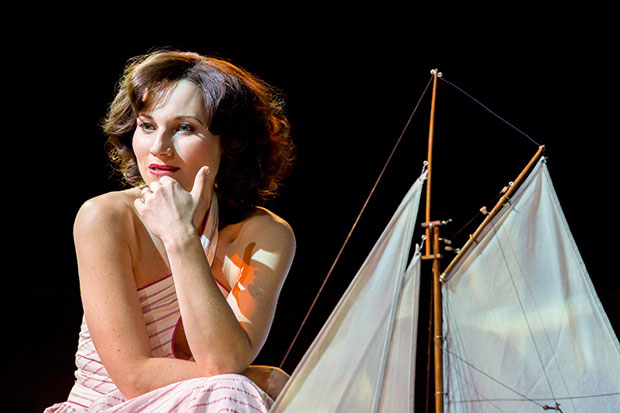Here come the Yanks. As the summer jumbos disgorge their cargoes of wealthy, courteous, culture-hungry Americans, the West End prepares to bag a fortune. Death of a Salesman is just the kind of timeless post-war classic that Americans adore, isn’t it? Not quite. Arthur Miller is mistrusted in his homeland. For starters he was a closet pinko who kept the closet door wide open. He was wooed by Hollywood but spurned every inducement. He married Marilyn Monroe and failed to make her happy. And top of the chargesheet is this play, which proposes that the American dream is a con, a swindle, a diabolical cruelty that hounds mortals to death by engorging their bellies with fantasies of happiness. It’s a superb artefact but relentlessly uncomfortable to sit through. A bit like complex dental work. Awful during, better after.
All hail to Stephen Brimson Lewis’s design which evokes run-down Brooklyn with concise visual gestures. Antony Sher’s portly bleating performance reminds us what a terrible salesman Willy Loman is: gauche, nervous, over-eager and quite humourless, but convinced his patter is amusing. Couple of thoughts. Sher’s voice is seagull thin and its register high so at moments of great passion he lacks gravitas and manliness. Occasionally, he squawks. Not his fault. That’s how his chords work. And he uses too much shorthand here, sometimes leaping to a fresh emotional state without showing us how he got there. Tricky, however, to address these shortcomings during rehearsals because the director, Greg Doran, is the real-life pair of Sher.
Loman’s wife is played by Harriet Walter, who has the echo of a lovely face and has scrubbed out every remaining hint of desirability. It’s in the script: the lank grey hair, the crab-apple cheeks, the dustbowl pallor. Walter drags herself around in a dowdy apron utterly devoted to her faithless, quailing mate and she emerges ennobled and magnificent. It’s an extraordinary performance made out of virtually nothing. Somehow she captures Linda’s abject glory and raises the doormat to the height of the lintel.
This is a fine production of a painful play which may well succeed in attracting throngs of Americans. But it’s a bit like staging The Quare Fellow on Broadway and expecting the Brits to flock.
More Yank-bait on the South Bank. Kevin Spacey has destroyed the Old Vic by rebuilding its interior as a traverse space (‘in the round’ as it’s called) with sparkly floors and corny, thrusting balconies. A booze-cruise disco bar would look more sophisticated. The higgledy-piggledy seats have been arranged in odd chunks here and there as if lumped into place by a giant baby. Someone should pin a notice on the Old Vic’s main entrance: ‘Please leave this room as you found it.’ Spacey’s gaudy pit is the setting for High Society, which transports us to the elegant, luxurious Hamptons for a summer of cocktails, stolen kisses and jinxed romances among America’s wealthy elite. The director, Maria Friedman, is a cabaret star and the show at times feels like a medley of nightclub hits rather than a full-blown musical.
The informalities began at curtain-up when a perky keyboard-masseur addressed us from the stool. ‘What tune do you want?’ ‘Leader of the Gang by Gary Glitter’ formed on my lips but I was anticipated by a wag in the circle: ‘Prokoviev’s Fifth’. This hilarity sparked a cascade of pretentious nominations, which culminated in Purcell via Scriabin, Saint-Saëns and John Cage. High Society, which began as the stage play The Philadelphia Story, is a beautiful delicacy featuring a bolshie American heiress, Tracy Lord, about to marry a rich dork even though she still pines for her dashing first love. Katharine Hepburn played Tracy in the 1940 film alongside James Stewart and Cary Grant. The 1956 musical remake starred Grace Kelly with Crosby and Sinatra helping along. These long shadows are bound to darken any revival and not every cast member here can match their predecessor.
Rupert Young, as Tracy’s first squeeze, is so suave and debonair he seems to have been built out of charm, not atoms. Newcomer Ellie Bamber (Dinah Lord) is eye-catchingly brilliant. Jamie Parker (in the Sinatra role of Mike Connor) has too much of the gutter about him to make a credible partner for the swishing, aristocratic Tracy, who could kill a tiger with a look. He has a great voice, though. Kate Fleetwood surpasses Grace Kelly for personality (not hard), and comes close to Katharine Hepburn for truculent swagger — a superb singer with charisma galore. But her greatest asset is her creamy and extraordinary face. Check it out on Google. Buried deep are two sharp, smoky grey eyes that pierce and unnerve. The mouth is wide, thin and jeering. And the broad cheekbones are soft whetted blades. Adorable or terrifying? I’m not sure. She makes Medusa look like a dinner lady.







Comments